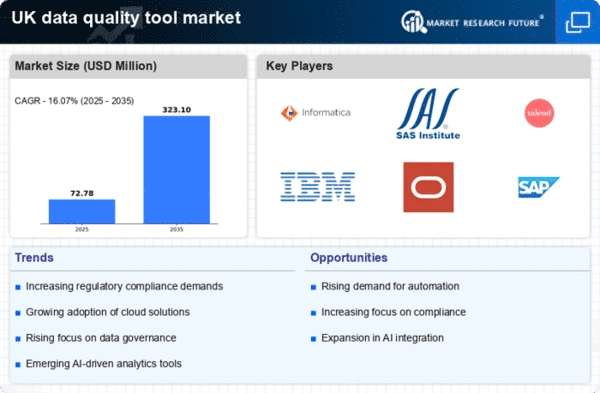Increased Focus on Data Privacy
In the context of the data quality-tool market, the heightened focus on data privacy is a significant driver. With the implementation of stringent data protection regulations in the UK, such as the General Data Protection Regulation (GDPR), organisations are compelled to ensure that their data management practices are compliant. This has led to a growing recognition of the importance of data quality tools that not only enhance data accuracy but also safeguard sensitive information. Companies are increasingly adopting data quality solutions that incorporate privacy features, enabling them to maintain compliance while improving data integrity. The market is expected to witness a robust growth trajectory, as businesses prioritise investments in tools that facilitate both data quality and privacy compliance, potentially leading to a market expansion of around 12% in the coming years.
Rising Demand for Data Accuracy
The data quality-tool market is experiencing a notable surge in demand for enhanced data accuracy. As businesses increasingly rely on data-driven decision-making, the need for precise and reliable data has become paramount. In the UK, organisations are investing heavily in data quality tools to ensure that their data is not only accurate but also actionable. This trend is reflected in the market's projected growth, with estimates suggesting a compound annual growth rate (CAGR) of approximately 15% over the next five years. The emphasis on data accuracy is further driven by the need to comply with regulatory standards, which necessitate high-quality data for reporting and analysis. Consequently, the data quality-tool market is likely to expand as companies seek solutions that can provide real-time data validation and cleansing capabilities.
Integration of AI and Machine Learning
The integration of artificial intelligence (AI) and machine learning (ML) technologies into the data quality-tool market is transforming how organisations manage their data. These advanced technologies enable automated data cleansing, anomaly detection, and predictive analytics, significantly enhancing the efficiency of data quality processes. In the UK, businesses are increasingly leveraging AI-driven tools to streamline their data management workflows, which can lead to substantial cost savings and improved operational efficiency. The market for data quality tools that incorporate AI and ML capabilities is projected to grow rapidly, with estimates indicating a potential increase of 20% in adoption rates over the next few years. This trend reflects a broader shift towards intelligent data management solutions that not only improve data quality but also provide actionable insights.
Emergence of Cloud-Based Data Solutions
The emergence of cloud-based data solutions is reshaping the landscape of the data quality-tool market. As organisations in the UK increasingly migrate to cloud environments, the need for data quality tools that can seamlessly integrate with these platforms has become critical. Cloud-based solutions offer scalability, flexibility, and cost-effectiveness, making them attractive options for businesses looking to enhance their data management capabilities. The market is expected to experience substantial growth, with forecasts indicating a potential increase of 25% in the adoption of cloud-based data quality tools over the next few years. This trend underscores the necessity for organisations to invest in tools that not only ensure data quality but also align with their cloud strategies, thereby driving innovation and efficiency.
Growing Importance of Data-Driven Decision Making
The The data quality tool market is being driven by the growing importance of data-driven decision making across various sectors in the UK. As organisations recognise the value of leveraging data for strategic insights, the demand for high-quality data has intensified. This shift is prompting businesses to invest in data quality tools that ensure the reliability and accuracy of their data assets. The market is witnessing a significant uptick, with projections suggesting a growth rate of approximately 18% as companies seek to enhance their data governance frameworks. By prioritising data quality, organisations can make informed decisions that drive operational efficiency and competitive advantage, thereby reinforcing the relevance of data quality tools in the current business landscape.
















